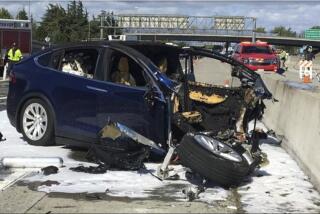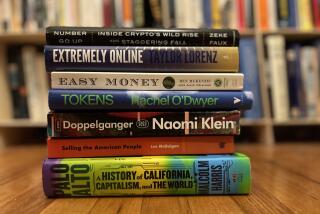Futurist Takes Stock of the Present
- Share via
It was a busy morning for futurist Alvin Toffler. He sped through Los Angeles like an electronic circuit rider, barely pausing for breath as he made the rounds promoting his new book “Powershift.”
In a two-hour span he polished off visits to KTWV Radio on Sunset Boulevard for David Hirsch’s “The Wave Window,” Cable News Network’s television studios and a live interview with Sonya Friedman, and KABC Radio for host Michael Jackson’s call-in show. The pace was appropriate for Toffler, whose specialty is accelerated change and how we adapt to it.
“We are living during one of the greatest turning points in history,” maintains the writer who made “Future Shock” a household phrase.
With his wife and collaborator, Heidi Toffler, he has monitored societal change for the last 40 years, circling the globe, meeting with world leaders, lecturing, consulting, researching and writing. (Although his preface acknowledges his wife’s “intensive” participation, and describes their work as a partnership in research and conceptualization, Alvin Toffler, as the writer, gets the author’s credit).
Their role, he emphasizes, is not to make predictions about the future (“That sounds like a fortuneteller”), but to clarify the present. And what he sees, looking around the world today, is a top-to-bottom shake-up of unprecedented proportions.
“We are in for some very turbulent times,” he said. “The power systems that held countries and institutions together are disintegrating--not just governments, but banks, trade unions, and the media.”
Eastern Europe’s overthrow of Communist regimes and the dismantling of the Berlin Wall have made part of the tumult obvious. But below that global surface, the Tofflers identify manifold changes that affect the lives of everyday people, as traditional institutions and authority figures start losing their clout. For instance, the wide-ranging “Powershift” describes such phenomenon as:
* The dethroning of medical doctors in the United States from “white-coated gods” to a profession besieged by malpractice suits, insurance companies, militant nurses, health-care conglomerates and patients who “talk back.”
* The demise of banks as money nearly disappears as a medium of exchange, replaced by a Video Age world of multiple “designer currencies.”
* The growing interest of large corporations in acquiring small mom-and-pop businesses to let them continue within the larger organization as “fam-firm” units valued for their flexibility.
* The weakening of the three television networks that now face so much competition that their futures are in doubt.
These institutional shifts are only a sampling of an elaborate kaleidoscope of change Toffler has incorporated in “Powershift” (Bantam Books, $27.95), an ambitious, 550-page attempt to synthesize what the author describes as the “dawn of the Powershift era.”
“It is about the crescendoing struggles for power that still face us as the industrial civilization loses world dominance and new forces arise to tower over the Earth,” he writes. Essentially, the book expands on the information explosion of the 1980s, and Toffler’s own earlier writings, describing a world moving from an industrial (or smokestack) society to a new computerized Age of Information in which, says Toffler, power is directly linked to knowledge. “Knowledge has become central to economic development,” he said. “It’s the new raw material, taking the place of brute labor. That’s what’s new.”
In the Information Age he describes, power can be as simple as one person using a fax machine to send information across the globe. Or it can be as complex as global guerrilla groups utilizing satellites, lasers, computers, briefcase weapons, precision targeting and a choice of viruses with which to attack people or computers.
And that, he contends, is changing all patterns of relationships.
“Powershift” is being promoted by Bantam Books as the third in a trilogy “describing the emergent civilization of the 21st Century.” Toffler, a writer and social analyst who carved out the specialty of trying to make sense of “accelerant change” early in his career, also describes the books as a series, noting that he first warned of the racing pace of change in “Future Shock,” his 1970 book, which sold an estimated 7 million copies around the world. A decade later, Toffler’s “The Third Wave” also became a worldwide bestseller, valued for analyzing the direction of change from an industrial to a high-tech world.
And now, says the author, “Powershift” focuses on the control of changes still to come--who will shape them and how--and questions that are still unanswered.
The Tofflers, who maintain homes in Los Angeles and Connecticut, are voracious readers and global travelers who have met with world leaders from Mikhail Gorbachev to the late Indira Gandhi. “Powershift” is being published simultaneously in Spain, Latin America, Germany and the Netherlands.
And in Japan, which Toffler describes as their “next most important readership after the United States,” a television documentary is being prepared in connection with the new book.
“Japan is a very future-oriented culture,” Heidi Toffler noted. “They’ve been onto the Information Age idea since we started talking about it.”
Added her husband: “They glommed right onto it. As a matter of national policy, their government helped smokestack industries like shipbuilding wind down and convert to telecommunications and computers and robots.
“In contrast, our politicians still think of the Information Age as a ‘little Silicon Valley thing.’ ”
It is their feeling that not only our political systems but most of our institutions are headed for major revamping before they are able to deal with the new realities.
“Nothing continues forever, and change won’t continue forever,” said Toffler. “We’ve had decades of technological upheaval and technological change and are still on the accelerating end of this process. Now we are going to hit turbulence because it is now affecting those power institutions that have been embedded, that are hardest to change.
“Now the chickens are coming home to roost. The power structure is incongruent with the rest of society.”
The evidence, he says, is the convergent crises faced by all the industrial societies: crises in urban systems, health systems, welfare systems, transportation systems, ecological systems and educational systems.
“Smokestack politicians continue to respond to these crises one at a time, with variations of the old approaches. But they may be insoluble given existing institutions,” he writes.
Although “Powershift” deals exhaustively with change, bolstered by 75 pages of bibliography and notes, there are no conclusions and no utopian promises. Toffler doesn’t even throw out a few suggestions for coping in the power-shifting world ahead, just this advice:
“The future is not ‘knowable’ in the sense of exact prediction. Life is filled with surrealistic surprise. . . . Nevertheless, as we advance into the terra incognita of tomorrow, it is better to have a general and incomplete map, subject to revision and correction, than to have no map at all.”
More to Read
Sign up for our Book Club newsletter
Get the latest news, events and more from the Los Angeles Times Book Club, and help us get L.A. reading and talking.
You may occasionally receive promotional content from the Los Angeles Times.








